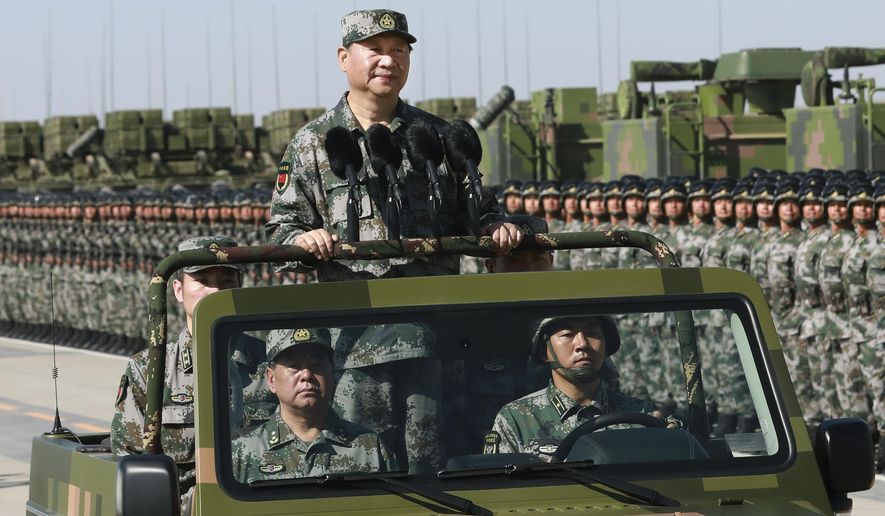Top U.S. and Chinese officials traded explosive accusations Sunday over Beijing’s handling of the COVID-19 pandemic, fueling fears that a “new Cold War” between the two global powers is on the horizon.
Speaking at a press conference in Beijing, Chinese Foreign Minister Wang Yi said U.S. leaders are pushing “countless lies and conspiracy theories” about the origins of the virus and China’s efforts to contain it, and he warned that American states seeking to sue China for damages caused by the outbreak are “daydreaming.”
“It is the most regrettable that while the coronavirus is still out there, a political virus is also spreading in the U.S. and jumping at any opportunity to attack and slander China,” Mr. Wang said, as quoted by the Beijing-based China Global Television Network. “It’s time for the U.S. to give up its wishful thinking of changing China or stopping the 1.4 billion Chinese people’s historical march toward modernization.”
Mr. Wang added that some U.S. political figures are “taking China-U.S. relations hostage and pushing our two countries to the brink of a new Cold War.”
The fiery comments come as the Trump administration and officials in countries across the globe charge that China mishandled the early days of the COVID-19 outbreak, hid key pieces of data, lowballed death counts in major hotspots, and have failed to operate with the kind of transparency expected from a civilized nation during an unprecedented international health crisis.
White House national security adviser Robert C. O’Brien went so far as to allege that China’s approach to the crisis will live in infamy alongside the Soviet Union’s Chernobyl nuclear power plant meltdown, which Moscow initially kept under wraps in order to protect its image.
“Look, this was a virus that was unleashed by China. There was a cover up that someday they’re going to do an HBO show like they did with Chernobyl on this virus,” Mr. O’Brien told CBS’s “Face the Nation.” “We don’t know who in the Chinese government did it, but it doesn’t matter if it was the local Chinese government or the Communist Party of China. This is a real problem and it cost many, many thousands of lives in America and around the world because the real information was not allowed to get out. And it was a cover up. And we’ll get to the bottom of it eventually.”
President Trump last week threatened to permanently pull U.S. funding from the World Health Organization over its handling of the outbreak and, in particular, for not holding Beijing’s feet to the fire in the crucial early months of the crisis.
Mr. Trump in recent weeks has ratcheted up his own rhetoric toward Beijing, repeatedly dubbing the coronavirus a “Chinese virus” and saying the country’s inaction contributed to the spread and cost countless lives.
Meanwhile, several U.S. states — led by Missouri — have sued China for damages related to COVID-19.
Mr. Wang dismissed those lawsuits.
“If anybody thought they could use some ludicrous lawsuits to undermine China’s sovereignty and dignity or to deprive the Chinese people of their hard-won gains, they [are] daydreaming and bring disgrace to themselves,” he said.
Mr. Wang also argued that the U.S. is merely hurting itself by continuing to focus on China rather than its own response to the outbreak.
“COVID-19 drives home once again that no country, no matter how strong it is, can insulate itself from a global challenge,” he said. “Pointing fingers at others will only end up damaging one’s own reputation. Self-conceit and blame-shifting will not help one solve its own problems.”
U.S. officials have stopped short of proclaiming that a new Cold War is inevitable but they readily concede that the coronavirus has fundamentally shifted the American-Chinese relationship.
“There’s certainly been a change in this country over the last few months after we’ve seen what China has done with regard to the coronavirus. I think it’s the latest example of China once again not living up to its international obligations, saying one thing and doing another,” Defense Secretary Mark Esper told radio host Hugh Hewitt on Friday. “I’ve seen this relationship with China evolve over time. And I think the stronger and more capable we are, the more likely we are to preserve the peace and to keep the relationship or get the relationship back on the right track.”
• Ben Wolfgang can be reached at bwolfgang@washingtontimes.com.




Please read our comment policy before commenting.